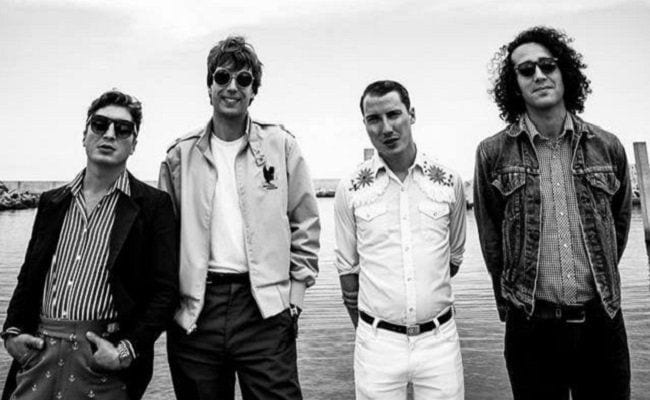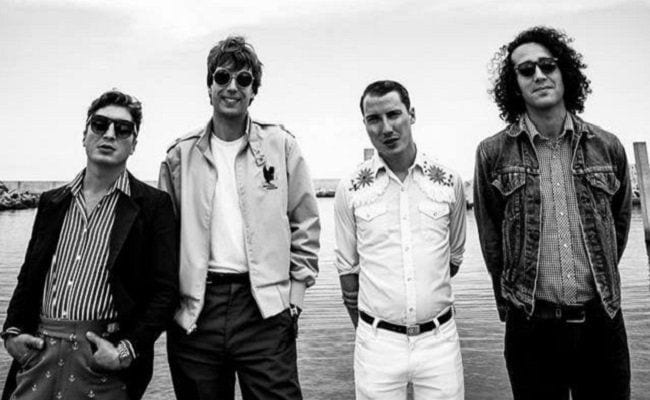
What do you do when your heart isn’t in it anymore?
Life, work, love, when the flame is flickering and threatening to burn out, you are ostensibly left with two options. The first is to keep going. Soldier on regardless, in the vain hope that it’s a blip. Maybe the situation will improve. Perhaps it’s a temporary glitch that will work itself out before normal service can be resumed. Whatever spark had gone will flicker back; giving you renewed drive, impetus. The second option is to make a change. If something can’t quite be salvaged, you could choose to leave the past behind and strike out anew.
For Islands frontman, Nick Thorburn, that is exactly the situation he finds himself in.
For over a decade Nick Thorburn has been fronting bands and creating music. Firstly, as part of The Unicorns, the Canadian indie band that burnt brightly but inevitably collapsed under the weight of an exhaustive touring schedule and fractured relationships. Then, whilst still reeling from the split, Thorburn busied himself in the hip-hop project Th’ Corn Gangg as well as Islands, the latter of whom released their critically acclaimed debut Return to The Sea back in 2006. Since then the band has gone on to release seven albums in total with the most recent being the spiritual sequel to their debut Should I Remain Here At Sea? and the more synth-heavy Taste.
At this moment in time, Thorburn finds himself at something of a crossroads. The band that has been his ballast for the last ten years, doesn’t feel like the creative outlet he wants in his life anymore, “I’ve also [been] doing this for 13 years. I sort of hit the wall. I think I’ve kind of said most of what I have to say. I’m sure there will be other things but the feverish need to make records has sort of subsided.” Thorburn continues: “I feel like taking more of a sort of back seat with that from now on.”
Thorburn has clearly been wrestling with this decision for some time. After all, it can’t be easy to give up something that has been your life for such a long time.
With that in mind Thorburn is keen to dispel any romantic notions of life as a touring musician, noting that “There is a degree of tedium that as I get older becomes intolerable. More with the promotion of the music, with the touring and that kind of thing. That’s the thing that feels like a distraction from more creative things that I could be doing. Rather than recreating something that I have already made. Just trying to promote. I don’t enjoy it as much. There are aspects of being in the band that are so boring. People think you go backstage and shoot heroin and get blow jobs and play a show but the reality is so much more anticlimactic.”
Couple that with the inherent difficulties of making money with the rise of streaming and the decline of physical sales leaving touring as the only real revenue stream, “It doesn’t really generate money and Islands exists in a capitalist society where if someone wants to make a record, It costs money and touring is the connective tissue between record making and record selling and if I don’t really want to tour it kind of renders Islands dead effectively. I need to do some serious reassessments but I’m kind of feeling that it needs to become a dormant thing for a while and I just need to take stock and reassess and if Islands needs to be a part of that.”
To that end, Islands are playing two shows marking the re-release of their debut album Return To The Sea in what appears more and more like the end of a chapter for the band if not the whole book itself. However, looking back ten years is not something that sits easily with Thorburn. “I don’t like it,” he starts, “It’s regressive and it’s not productive and I do it enough with my song writing. All my sad songs are these bloated, heavy nostalgia trips which I just can’t seem to shake so looking back to a thing which is already about looking back. I just seem to be stuck in a loop. I try to keep that sort of thing to a minimum.” Like many musicians it is the future that excites him rather than any wistful reminiscing, “I’m much more forward looking and growing and making new things. My hell would be a casino act that just plays their one song from 30 years ago. I’d rather be destitute and homeless than in a gold plated house living off a bygone era.”
Naturally, this begs the question why do it all? Despite the reticence to look back, Thorburn is quick to acknowledge that the ten year anniversary of the record is a valid achievement for the band. “You’ve got to do a show,” he notes. “We are re-releasing the record and we have to commemorate it in some way. There has to be some kind of acknowledgement of milestones.”
The two shows are the band’s way of embracing the past and for them and the audience it is important to make it as memorable and enjoyable as possible: “The idea is to make it fun. If I am going to go on the nostalgia circuit, albeit very briefly, then it should be a celebration, like a birthday party. We’re going to have a bunch of friends come out and just have fun with it. It’s going to be fun and the emphasis is going to be on trying to enjoy ourselves. I think it will be cool. We aren’t just going through the motions that’s for sure.” Nonetheless, when the shows are over don’t expect to see Islands play anytime soon, “This is kind of our token tip of the hat and then we’ll go and hide for a long time after this, I think.”
Reproducing an entire record in a live setting possesses its own difficulties, especially one that Thorburn feels so far removed from, “As you grow away from it you reject it but you come back around and you are so far removed you can see whatever charm it had. Hopefully, it has some kind of charm even if it’s cloyingly annoying which I feel a lot of that record is for me. As soon as the ten years was up I was able to hear it and be slightly removed and have a different perspective. It was less embarrassing, like seeing an old video of yourself and then you become so different as a person that you don’t recognise yourself.” There is one particular aspect of Return To The Sea that still frustrates Thorburn: “The way that I sing. I bristle when I hear my voice. I sound so earnest and twee that I feel so disconnected with.”
There is one song in particular that Thorburn has had something of a troubled relationship with. “‘Rough Gem’ was a song that people would request for years and I had disavowed that song. I had refused to play it.’ He goes on to say that “It was only this year that I decided to find a way to make the song work like adapt it to where my head was at now so we were doing a very stripped down version. Reduced to its kind of rock ‘n’ roll basics. I took out all the bells and whistles which were the things that were driving me nuts as it just sounded so silly sounding. However, for these shows I think we are going to be straight up more faithful to the record itself. It might sound more like the record.”
An additional issue is that many of the songs have never featured in their live set. “We’ve really only played just under half that we’ve revisited. About half of the record the current incarnation of the band has never played. So there is learning to do. There is one song that is in a weird alternate tuning and I’ve forgotten the tuning. I have no idea how to play it.”
The idea for the reissue of Return To The Sea came from Thorburn and it is his way of righting a wrong. As he explains, “We signed to a very small label in Montreal. There was just one of those situations where there was just bad accounting and they never paid us anything. It sold more than all of our other records combined. So I definitely felt jilted by that experience so when the clock ran out on the ten year license I was very eager to get the record back and reissue it on my own label, my own imprint.”
Initially, Thorburn had a different idea of what he wanted from the reissue, noting that “At first I wanted to revisit it and remix and overhaul it but I realised what it was with all of its flaws and imperfections was the thing that it should be. It is what it is.”
So with the band’s time seemingly at an end it begs the questions; what now? For Thorburn the answer presented itself with the unexpected success of his work scoring the mammothly successful Serial podcast. This then led him to score a Canadian movie set in Columbia and he is currently working on the score to the comedy-drama Ingrid Goes West which will be released sometime next year. This is, for him, a newly discovered aspect of music making that excites him. “I think this is the turning point,” he tells us. “This is going to be the thing that I’m going to do now. It’s sad in a way but it’s a new era but an exciting one. Rock music is so boring to me right now, it’s so dead, so dead and all of the trappings of being in a band I am so bored by it. I think I need a long vacation from that and this seems like a good one.”
After playing in as many bands for as long as he has, his new career has meant unlearning everything that came so naturally for him. “I’ve spent 13 years honing how to write memorable melodies and hooks and make a cool song. These are not songs; they are there to service the picture. It’s an ego blow but it’s a good tool for my brain to get used to. I love it but hate it at the same time. It’s a different muscle and I’ve calcified the others.”
For Thorburn, his dissatisfaction with being in a band is more than a blip or a glitch; it is the result of devoting the majority of his adult life to being in a band that has lost its lustre. It simply does not hold the same magic as it once did. Evidently, it is time for a change. One where he can feel a little uncomfortable again. Where the excitement of creativity is paramount and all the extraneous concerns just disappear. Before then, it’s time for one last hurrah. One last party for the band before they close the lid on Islands.

